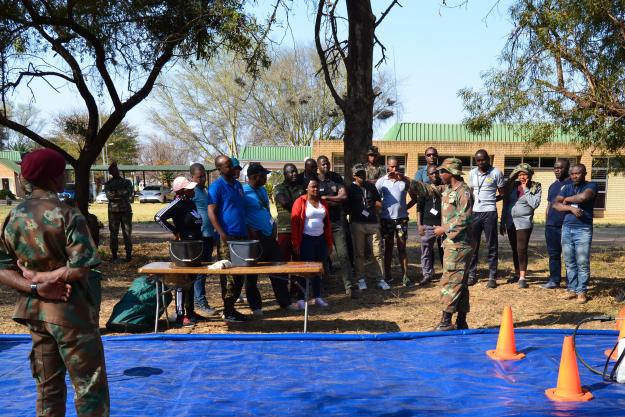The Organisation for the Prohibition of Chemical Weapons (OPCW) and the Government of the Republic of South Africa co-organised an Incidents Commanders Course for African States Parties from 21 August to 1 September at the Ditholo Airforce Base in Tshwane, South Africa. The aim of the course was to equip participants from African States Parties with the leadership capacities required to handle chemical emergencies and to increase the number of experts able to operate in a command role.
The training directly supports capacity building for the implementation of Article X of the Chemical Weapons Convention (CWC), which covers assistance and protection against chemical weapons. Capacity in this regard may also be applied to respond to emergencies which involve toxic chemicals. The training was delivered by instructors from the 7th Medical Battalion Group of the South African National Defence Force supported by experts from the OPCW Technical Secretariat and the Protechnik Laboratories of South Africa.
In her opening remarks, Major General Mphikeleli Simelane, Chief Director of South Africa's Military Health Force Preparation, stated: "Participants in this course will increase their knowledge and insight into command and control of chemical incident response and will practice these skills in a field exercise."
In her remarks, Ms Deidre Penfold, a member of the South African Council for the Non-Proliferation of Weapons of Mass Destruction, emphasised: "This course brings together experts and professionals from all over Africa who are committed to improving national incident commanders' capacities and competencies in managing chemical incidents involving toxic chemicals. We recognise the importance of thorough assistance and robust protection measures required in preventing, preparing for and responding to incidents involving chemical agents."
Participants tested each other and performed various command roles to learn strategies that could be later implemented in their respective countries as incident commanders.
The training was attended in person by 19 experts from 11 OPCW Member States: Algeria, Angola, Botswana, Burkina Faso, Gambia, Ghana, Kenya, Nigeria, Seychelles, South Africa, Tanzania

Background
As the implementing body for the Chemical Weapons Convention, the OPCW, with its 193 Member States, oversees the global endeavour to permanently eliminate chemical weapons. Since the Convention's entry into force in 1997, it has been the most successful disarmament treaty eliminating an entire class of weapon of mass destruction.
On 7 July 2023, the OPCW confirmed that all chemical weapons stockpiles declared by the 193 States Parties to the Chemical Weapons Convention since 1997 - totalling 72,304 metric tonnes of chemical agents - have been irreversibly destroyed under the OPCW's strict verification regime.
For its extensive efforts in eliminating chemical weapons, the OPCW received the 2013 Nobel Peace Prize.






